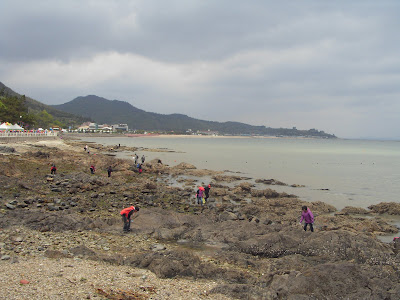* The bicycle race associated with the first annual Korean Bicycle Festival (대한민국자전거축제), which started on April 25th, will be in Suncheon on May 2nd. The race's Stage 8 starts from Palma Stadium and goes around Suncheon and Gwangyang before ending in Jinju. The parade from city hall to the stadium starts at 11:30, and the race begins at 1. More information, in Korean, from the Stage 8 page and from the two .hwp files linked on the city page.
* The Hampyeong Butterfly Festival (함평나비대축제) has been on since April 24th and will continue through May 10th. There aren't many butterflies, but the festival site is huge, pretty, and crowded.
* The Jeonju Film Festival (전주국제영화제) opened today and will continue through the 8th.
* There are a pair of festivals in Yeosu, the Turtleship Festival (여수거북선대축제) and the Tall Ship Festival (여수국제법선). I've had it up to here (motions with hand) with hearing about Yi Sun-shin, but the other festival looks pretty interesting. Both were profiled on Korea.net recently.
* Another important Korean historical figure will have a festival in his name on the 2nd and 3rd in Wando at the Jangbogo Festival (완도장보고축제).
* The Bamboo Festival (담양대나무축제) opens in Damyang on the 2nd and runs through the 7th. That should be crowded, but all right.
* The Jeamsan Royal Azalea Festival (제암산철쭉체) in Jangheung county is on the 3rd.
* The Hong Gildong Festival (홍길동축제) is in Jangseong county from the 2nd through the 5th. He is a fictious character who is, dare I say, like a Korean Robin Hood.
* And the "City of Beautiful People"
* A couple of festivals nearby are the tea festival in Hadong (하동야생차문화축제) and the Chunhyang Festival (춘향제) in Namwon, a cute little city that calls itself the "City of Love."












































